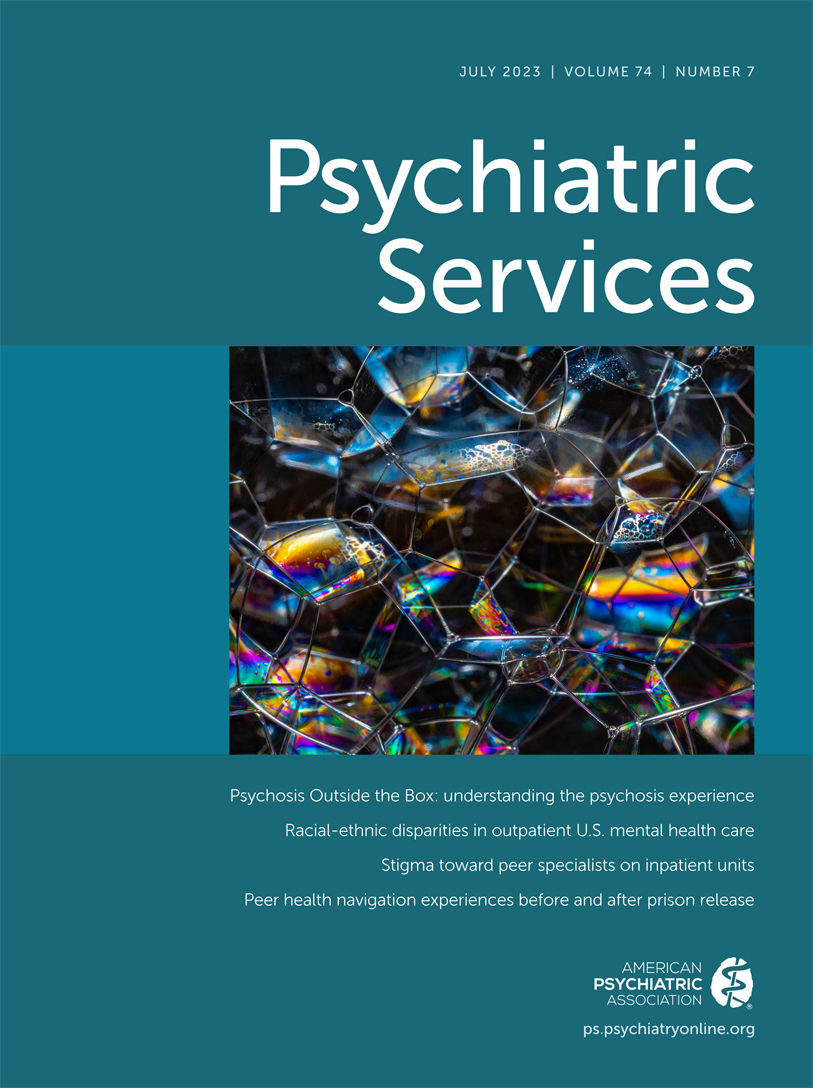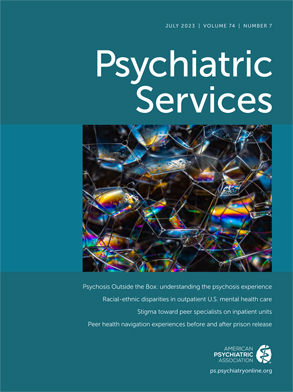Being a peer specialist on an inpatient unit has been a powerful experience. I have seen great care provided, and I have been a part of many transformative conversations. However, the work culture of the unit I work on and other units I have been to does not include staff treating patients and peer specialists as equals. A major shift in the culture of these units is definitely needed. I work in a hospital that has a civil rights campaign that advocates against racism and sexism and for LGBTQ rights and all other civil rights for staff members, yet mental health stigma is not addressed by the campaign. The truth is that a great deal of stigma toward patients and peer specialists exists within the hospital, and my sense is that people just are not aware of their unconscious biases and how these biases affect the care they provide.
Working on an inpatient psychiatric unit can be challenging mentally and emotionally, and staff understandably sometimes need to vent. However, there are good and bad ways to do so. I have witnessed many instances of staff disparaging the people we are serving. For example, it is common for distressed clients to frequently come to the nurses’ station to check in, because they are afraid they are in a dire situation. Usually, their situation is not as dire as they fear, but these feelings are happening for very valid reasons. Staff commonly get frustrated and upset with people for checking in. Although these frustrations may be valid, they are sometimes laced with stigmatizing sentiments. One of the difficulties of dealing with stigma is that it is usually mixed in with other conversation, which makes it difficult to parse out. As soon as the nurses’ station window is shut, a disparaging comment is made about the patient.
People sometimes act out against staff because they know staff do not look at them as equals. Staff can be diminishing in ways that they are not aware of but that patients do observe and find frustrating, and this shuts down communication. When people with lived experience are treated as equals by others in their everyday lives, it is very noticeable when staff do not.
I am currently doing well enough that my mental health condition is usually invisible, and staff cannot imagine that I have been through many of the same experiences as our clients. This has led to many difficult interactions I have had with other staff. Just recently, I met someone new to the unit who was a mental health specialist. I introduced myself, and she replied, “Nice to meet you! Are you a nurse or a mental health specialist?” Given that I work on this unit only 5 hours per week, many people do not know my job title. This is a common question, and it is distressing. Asking people whether they are peer specialists is almost assumed to be inappropriate.
I calmly replied, “I’m a peer specialist. I work throughout the division, and I’m usually just here on this day in the afternoons.” The mental health specialist’s facial expression tightened, and she withdrew a little bit. Her body language became diminished and fearful. Her voice became much softer and more caring and quivered slightly, which was not the norm for our prior conversations before being formally introduced. She replied, “So what do you do? Are you here to be in the milieu?” This common question is also exhausting, because staff assume that I just hang out on the unit—they do not have a sense of the work peer specialists do. I replied, “No, I usually facilitate a couple [of] groups on the unit. I also meet with people individually per the request of the teams and when clients request it. I’m also here to be a support and resource.”
She replied, “Oh, well, there’s no one here you’d want to meet with, everyone on this wing is really struggling.” I felt distressed by her assumption that I would not want to meet with someone who was really struggling. She also took an authoritative stance, even though she is not my supervisor and we had only formally known each other for 5 minutes. Her assumption that I needed guidance and that she was in charge was also diminishing. I just looked to the side, said something courteous, and walked away.
On a side note, when the teams are not able to help someone when they are struggling tremendously, peer specialists are often asked to meet with the patient to help create progress.
This is one specific instance I am highlighting; however, it is very common for coworkers to assume that I do not know what I am doing, that I need guidance to do my job, and that they have a better sense of my job than I do. I typically do not see these assertions and assumptions being made between nurses, social workers, doctors, and mental health specialists, so it is not within the culture of the unit for this to happen across all professions.
Another difficult request peer specialists frequently field is when staff feel a client would be a good fit for peer specialist work. For example, here is an e-mail I received from a team consisting of a social worker and psychiatrist:
We have a patient who is interested in speaking with you. The team thinks he could be a potential candidate in the future for becoming a peer specialist as he enjoys helping other patients on the unit. If you have time today or tomorrow to see him that would be great!
It feels strange and othering to me when people just assume clients want to become peer specialists. Many staff members get excited when they feel that someone would be a good peer specialist, and they inform me that it would be a good idea to meet with the person to discuss this possibility. The difficulty is that many clients do not want to become peer specialists, and it is not something they are even considering. Many people who are helpful to others are not necessarily wanting to work within the helping professions. When staff assume someone is automatically qualified for peer specialist work given they were helpful to others and they have insight into their own condition, I feel like the skill and ability needed to provide good care as a peer specialist are neither understood nor fully valued. It is possible that a client might want to become a peer specialist, but it is also true that they still can do any other job in the world, just like anyone else who does not have a mental health condition. I have had instances where I have been set up with meetings like the one requested in the e-mail, and the clients had no desire to be peer specialists. They already had jobs in completely different fields at which they were very successful. I also wonder why people are asked whether they would want to become a peer specialist and not whether staff would also consider possibilities such as a social worker, a mental health specialist, a psychiatrist, or a nurse? Many people with lived experience work in the latter roles, yet it is never assumed that these jobs could be undertaken by our clients in the way that the peer specialist role is.
Another component to this is that because a patient has lived experience and seems to be helpful to others, they are often assumed to have the ability to do well as a peer specialist. This assumption rarely seems to consider the training required to become a peer specialist and the serious responsibilities of the job. Although in Massachusetts the peer specialist certification process is not nearly as rigorous as graduate school, the job and its difficulties are commensurate with all the other jobs in the hospital. A few years ago, it was reported that in Massachusetts, the average peer specialist stayed in the job for only 14 months. Given that the job is stressful and difficult, it can be disheartening when we peer specialists find that the skills and abilities we have developed through the certification process, years of experience and supervision, and specialty training are not recognized or even known by our coworkers.
It is hard to work in an environment where my job is not seen as equal to other jobs in the hospital, the work is not valued as much, and a majority of people have only a slight sense of what I do. Good amounts of both skill and ability are required to be effective at peer specialist work. The instances of workplace stigma and stigma toward clients that I have described in this column are the kinds of experiences I have dealt with repeatedly over the past 5 years, and they are added challenges to the work. Many days I just avoid the nurses’ station altogether given the stigma that I regularly encounter there. I know the messages of inferiority, otherness, and exclusion are not all intentional, but they are still frequently present. We have set up space for both peer specialists working on this inpatient unit to have an off-unit area to retreat to when needed, and our supervisors understand that this is helpful to us.
At work, it is tough to be friends with people when you know they have unconscious bias toward your condition and your profession. I get the sense from my coworkers that they care about and genuinely like me, but I also perceive that I am not viewed and understood as an equal.
Within the hospital where I work, many mental health professionals are not aware of their unconscious bias against people with mental health conditions, but it is definitely there. People are also not aware of the effect that they and their unconscious bias are having on others, despite their good intentions. In a study on organizational climate, peer specialists reported the best climate was in peer-led programs separate from the clinical mental health organizations, the second best was in peer-led programs within mental health organizations, and the most difficult was when peers were working within clinical spaces (
1). The experiences I have described happen all too frequently for peer specialists and the people being served. The workplace needs to be transformed into a more egalitarian space.

